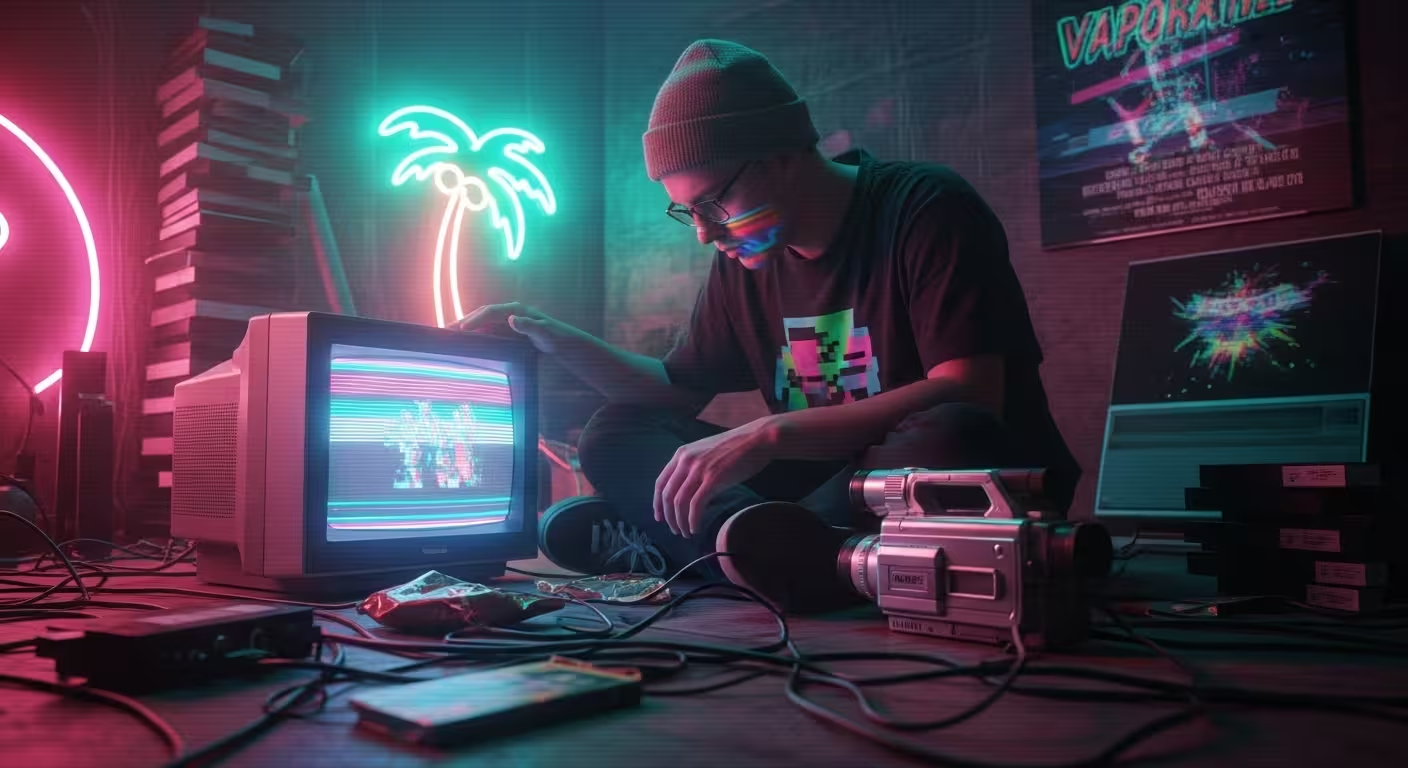If you’re making independent film in the UK right now, you’re standing at a thrilling intersection where creative storytelling meets advanced technology. Artificial intelligence isn’t a distant concept—it’s already transforming how films are written, produced and distributed across Britain. According to the BFI’s latest report,
AI tools are being used at every stage of production, from script development and post-production automation to visual effects and audience analytics. The UK’s film, high-end TV and video game industries collectively employ over 200,000 people and contribute approximately £21 billion in gross value added to the economy. Together, these industries are global ambassadors for British creativity and remain fundamental to the nation’s cultural and economic identity.
Beneath this success, however, lies a sector on the edge of its most dramatic shift since the digital revolution. Generative AI is democratising access to sophisticated production tools, empowering independent creators to craft high-quality work at scale. Yet as detailed in AIMICI’s analysis, the transition demands more than innovation—it requires robust governance and workforce upskilling to match the pace of change.
The CoSTAR Foresight Lab warns that ethical and environmental issues, from bias in training data to sustainability in production, need urgent attention if filmmakers are to harness AI responsibly.
The future of British cinema now depends on finding balance between technology and artistry—blending human vision with machine precision to ensure UK storytelling remains both globally competitive and unmistakably original.
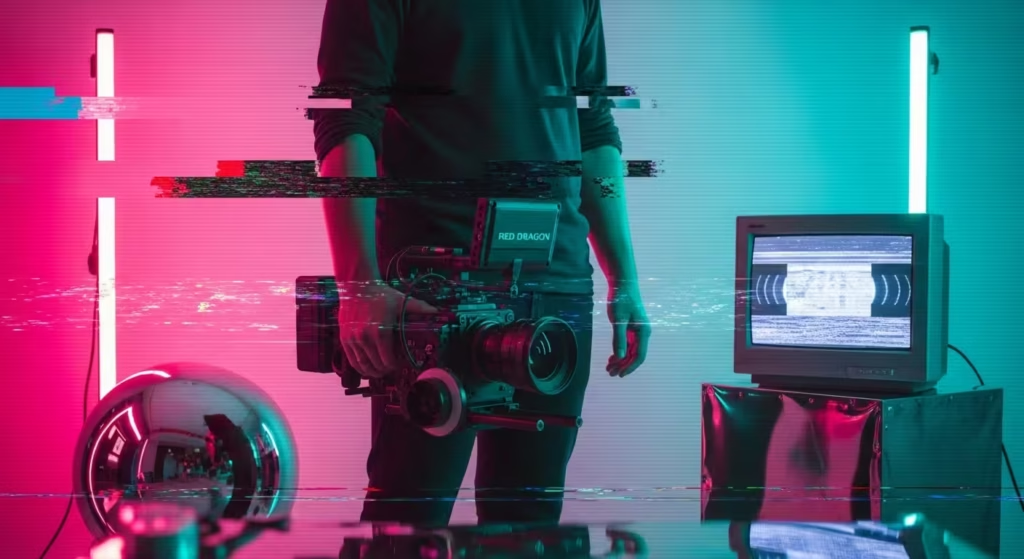
What is the economic scale of UK screen sector and its workforce?
The UK’s screen and wider creative sector represents one of the most powerful engines of national growth, contributing tens of billions to the economy each year.
- According to the latest Creative Industries Sector Plan, the creative industries—including film, high-end TV, gaming, advertising and design—generated over £119.6 billion in gross value added in 2023, equating to approximately 5.2% of total UK GVA.
- Updated figures from the Office for National Statistics show consistent growth into 2025, with GVA across Department for Culture, Media and Sport (DCMS) sectors rising by around 6% since February 2020—outpacing the general economy’s 4.9% expansion.
- In June 2025 alone, the creative and cultural industries were estimated to have grown by 1%, compared to 0.4% for the economy overall.
- Employment within the sector remains a cornerstone of the UK’s post-pandemic recovery. The Creative Industries Census 2025 estimates 2.4 million people now work in creative fields, representing roughly one in every 14 UK jobs.
- The Creative UK statistical bulletin highlights that towns such as Salford, Halifax and Manchester are key growth zones for film and digital media employment, reflecting regional diversification beyond London.
Two-thirds of creative jobs now exist outside the capital, reinforcing the sector’s critical role in the government’s “Levelling Up” agenda. Amid advancing automation, AI integration and new tax relief measures, the UK screen sector continues to prove itself both resilient and central to the country’s long-term economic and cultural future.
How is AI revolutionising indie film production in the UK?
Artificial intelligence is rapidly revolutionising independent film production across the UK, granting smaller studios and solo creators access to tools that once demanded major budgets. According to the British Film Institute and CoSTAR, generative AI is now enabling filmmakers to automate time-consuming pre-production tasks such as script breakdowns, casting analysis, and scheduling.
Platforms like Filmustage and LTX Studio allow creators to import scripts and instantly identify characters, props, and shooting sequences, dramatically reducing planning time. Storyboarding tools like Boords and visual design programs such as Midjourney turn written concepts into production-ready imagery. Meanwhile, collaboration platforms including AIMICI provide guidance on ethical AI integration for every stage of production, from development to final cut.
During production, generative AI is enhancing creative possibilities while cutting costs. The BFI’s research shows that more than 13,000 UK-based creative technology firms are driving this shift, pioneering solutions for automated visual effects, AI-supported animation, and intelligent post-production workflows.
Independent filmmakers are experimenting with systems like Kling AI to generate complex visual sequences typically out of reach for modest budgets. At events such as the Media Production & Technology Show, industry leaders have highlighted how AI is levelling the creative playing field while sparking debate around sustainability, data ethics, and human oversight.
From scriptwriting assistants to virtual editing suites, AI is not replacing filmmakers—it’s empowering a new generation of British storytellers to bring original ideas to screen faster, cheaper, and more imaginatively than ever before.
During production and post-production, the transformation of independent filmmaking in the UK has accelerated dramatically, with artificial intelligence redefining both process and possibility. London-based filmmaker Samir Mallal recently harnessed AI to create Midnight Drop, a 12-minute short film on the aftermath of US and Israeli airstrikes in Iran. Using Google’s Veo3, OpenAI’s Sora, and Midjourney, Mallal and co-director Bouha Kazmi completed a project that would traditionally have taken years and millions to produce—in just two weeks.
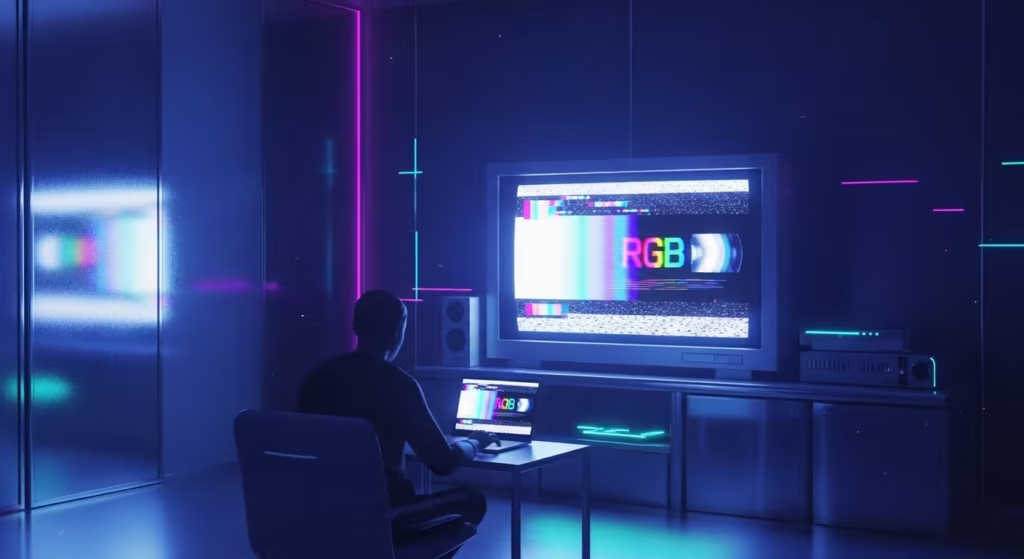
This new style of “cinematic news,” as Mallal describes it, allows artists to create rich, documentary-like films on current events almost in real time, bridging the gap between journalism and art. On the BBC’s AI Decoded, Mallal noted that while AI automates much of the technical craft, the director’s creative input still shapes tone, framing, and narrative rhythm.
These AI breakthroughs go far beyond visual effects. Advanced colour grading, automated sound design, and neural rendering algorithms are now bringing high-end post-production techniques to creators working with a fraction of traditional studio budgets. Tools like Veo3 and Sora interpret complex text prompts to generate realistic footage—an innovation heralded by critics as the biggest shift in visual storytelling since digital cinematography.
Commenting on The Rest is Entertainment podcast, writer and producer Richard Osman predicted that by 2027, most content across platforms such as TikTok, advertising, and trailers will be predominantly AI-assisted. The essence of filmmaking, however, remains the same: technology may accelerate production, but it is human creativity that continues to give these digital visions their emotional weight and cultural relevance.
What are the copyright risks of AI for UK filmmakers?
The British Film Institute (BFI) has issued a landmark report highlighting the significant copyright risks AI poses for UK filmmakers. It reveals that over 130,000 film and TV scripts have been used without permission to train generative AI models, posing a “direct threat” to the £125 billion UK screen sector’s economic foundations. This unlicensed use of intellectual property undercuts rights holders by using their creative works to teach AI systems, which can then replicate storytelling elements at much lower costs, potentially displacing original creators and devaluing their work.
The BFI report, AI in the Screen Sector: Perspectives and Paths Forward, underscores the urgent need for new licensing frameworks to allow fair compensation and control over AI training content. Between March 2023 and February 2025, 79 licensing deals were signed globally, signaling progress toward regulated IP use in AI development.
The UK aims to lead in this area by developing a generative AI training licence through its Copyright Licensing Agency, backed by a coalition of leading industry bodies including the BBC and Channel 4. However, uncertainties remain around transparency in AI training data, jurisdictional issues, and the pace of regulatory reform.
The BFI recommends embedding sustainability standards, fostering collaboration for ethical AI products, and supporting independent creators with accessible tools and funding. Without these, the legal and ethical challenges posed by AI copyright risk undermining the creative vibrancy and economic resilience of UK filmmaking.
The issue of AI’s use of performers’ likenesses and voices has become a major concern within the UK entertainment industry, with Equity — the principal trade union for performers — leading the charge for stronger protections. Equity is actively campaigning against unauthorized usage of members’ images, voices, and performances in AI-generated content, supporting actors like Briony Monroe, who alleges her likeness was used in creating an “AI actor” without consent.
The union demands transparency, consent, and fair compensation, emphasizing that these rights extend beyond traditional contracts to cover emerging AI technologies. Equity’s AI Vision Statement outlines core principles including consent, licensing on clear terms, moral rights protection, and equitable remuneration.
General Secretary Paul W. Fleming has highlighted ongoing negotiations with tech and entertainment companies, noting increased willingness to discuss compensation but warning that vigilance is essential as the industry navigates this new terrain.
In preparation for potential legal challenges and to enforce accountability, Equity plans mass data requests compelling companies to disclose whether AI creations involve members’ data without permission. The union also secured the government’s abandonment of damaging data mining exemptions after its “Stop AI Stealing the Show” campaign.
Despite progress, challenges around contract clarity, data protection, and regulatory gaps persist, prompting calls for new personality rights legislation to better protect performers from AI misuse and provide clear avenues for redress and control.

How is AI affecting job opportunities and training in UK film?
Artificial intelligence is significantly reshaping job opportunities and training within the UK film industry, generating both exciting prospects and valid concerns. The British Film Institute (BFI) warns that AI’s automation capabilities could displace junior or entry-level roles—such as runners, assistant editors, and rotoscope artists—that traditionally serve as essential entry points for new talent. This raises the risk of reduced pathways for emerging filmmakers and technicians to gain hands-on experience, potentially undermining the industry’s future talent pipeline.
The BFI report also highlights a substantial training gap, describing UK screen sector AI education as “more informal than formal,” with many freelance workers lacking access to structured upskilling resources. This shortfall threatens to create a two-tier workforce where only those with sufficient resources or industry connections can adapt to AI-driven workflows, exacerbating existing inequalities.
Given the freelance nature of much film work, this divide challenges equity and long-term sustainability. Addressing these issues will require targeted investment in accessible AI skills training, inclusive workforce development programs, and policy support to ensure opportunities remain open and fair amid technological disruption.
Ultimately, the success of AI integration in UK film depends on balancing innovation with robust strategies to nurture and protect human talent.
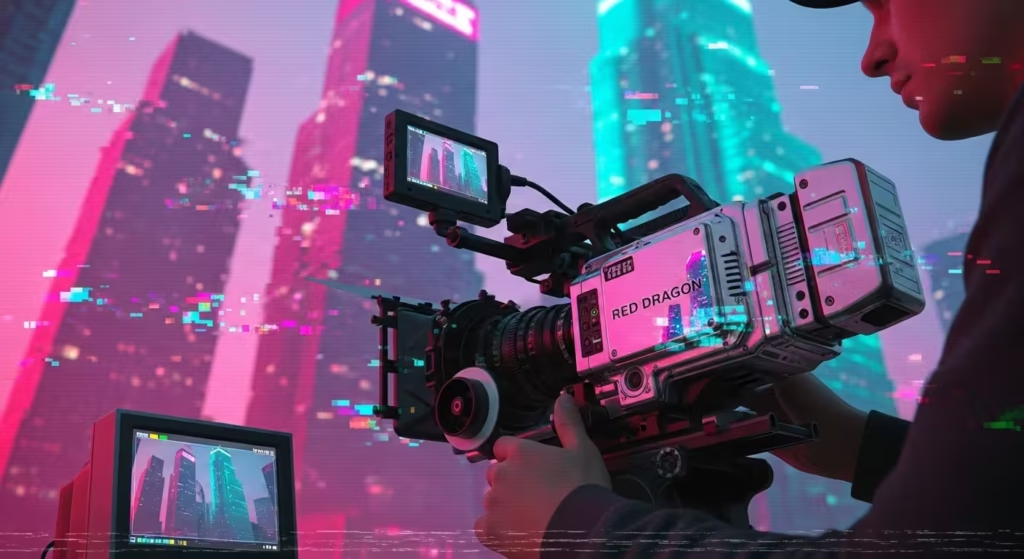
What policy responses and ethical frameworks are emerging?
The UK’s evolving policy response to AI’s impact on film is multifaceted. The Artificial Intelligence (Regulation) Bill proposes creating an AI authority to coordinate regulatory oversight, mandate transparency, and ensure accountability in AI use. This includes requiring businesses to report on third-party data usage in training AI and mandating health warnings and consent options for AI-driven products. Alongside this, the government’s 2024/25 copyright consultation aims to establish clear rights frameworks allowing creators to control and license AI training data use, addressing concerns about data mining and unauthorised exploitation of creative work.
At a sector level, the British Film Institute has put forward nine recommendations to develop ethical AI usage, including IP licensing markets, sustainable carbon-tracking standards, and inclusive AI datasets.
Trade unions like Equity support performers with practical resources such as legal toolkits and advocate for enforcing performers’ data rights amid rising AI synthesis of likenesses and voices.
Culture Secretary Lisa Nandy has reassured that fair payment for creative contributions remains a government priority. Together, these measures reflect a growing consensus that responsible AI integration will require collaborative governance, robust legal protections, and investment in skills and equity to safeguard the UK’s creative industries while embracing innovation.
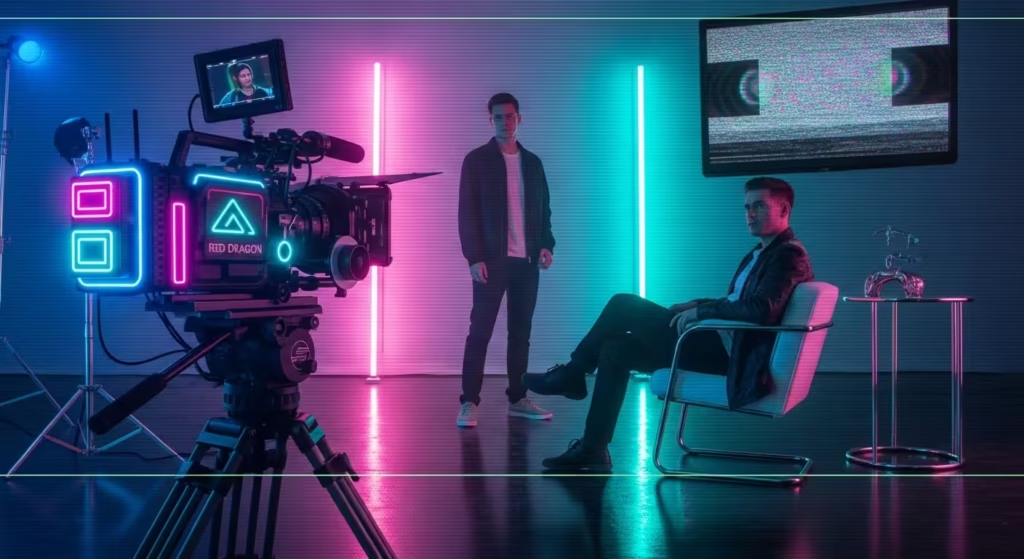
What does the future hold for AI in UK indie film?
The future of AI in UK independent film holds both tremendous promise and notable challenges. As recognised in the BFI’s report, generative AI offers the potential to revolutionise how stories are developed, produced, and distributed by lowering traditional barriers to entry and enabling creators with modest resources to realise ambitious visions.
AI tools can speed up workflows, reduce costs, and open global distribution channels, empowering a wider, more diverse range of British storytellers. Initiatives like the Charismatic consortium, backed by Channel 4 and Aardman Animations, seek to make AI tools widely accessible to creators regardless of budget or experience, signalling a shift toward inclusive creative economies.
However, the sector must navigate significant ethical, legal, and economic hurdles. Concerns about copyright, AI’s impact on skilled jobs, and the potential erosion of traditional business models remain pressing. As emphasised by industry leaders, the future will depend not only on technological advancement but also on robust policy frameworks, strong ethical governance, and targeted investment in skills training to ensure sustainable growth.
The UK’s established creative technology ecosystem, featuring over 13,000 companies, places it in a strong position to lead global innovation responsibly. Success lies in harnessing AI to enhance human imagination and preserve the unique voices and economic models that have made UK independent film a global cultural force.

Essential AI tools for UK indie filmmakers
Navigating the rapidly expanding ecosystem of AI tools can be daunting. Here’s a curated selection of practical AI tools relevant to UK independent filmmakers across different production stages, with a comparison of their primary functions and pricing:
| Tool | Primary Function | Pricing (Monthly) | Ideal For |
|---|---|---|---|
| LTX Studio | All-in-one pre-production to post | From $35 | Complete AI filmmaking workflow |
| Filmustage | Automatic script breakdown & scheduling | From $39 | Production managers & 1st ADs |
| Boords | AI storyboard generation | From $49 | Directors & storyboard artists |
| Midjourney | Concept art & mood boards | From $10 | Production designers |
| Veo3/Flow | AI video generation | From $18.99 | Visualising scenes & creating assets |
| Studiovity | Integrated scriptwriting & scheduling | From $24 | All-in-one pre-production |
The AI tools available to UK independent filmmakers in 2025 represent a transformative range of resources that enhance every stage of the production process. Platforms like Storyboarder.ai allow rapid visualisation of scenes directly from scripts, while Runway ML offers powerful AI-driven video editing and visual effects without the need for large teams.
Voice generation tools such as ElevenLabs enable quick dubbing and narration, and AI writing assistants like ChatGPT support script rewriting and development.
An effective AI-enhanced workflow blends multiple platforms, chosen based on project needs and production stage, allowing creators to maximise efficiency without relinquishing creative control. Additionally, resources like Filmustage automate complex pre-production tasks such as scheduling and budgeting, freeing filmmakers to focus on storytelling.
Complementary initiatives such as Film London Labs provide vital support and guidance at early creative stages. Ultimately, while these AI tools dramatically democratise filmmaking capabilities, their real power lies in serving—not dominating—the filmmaker’s vision, preserving the distinctiveness that defines British independent cinema.
